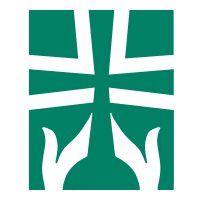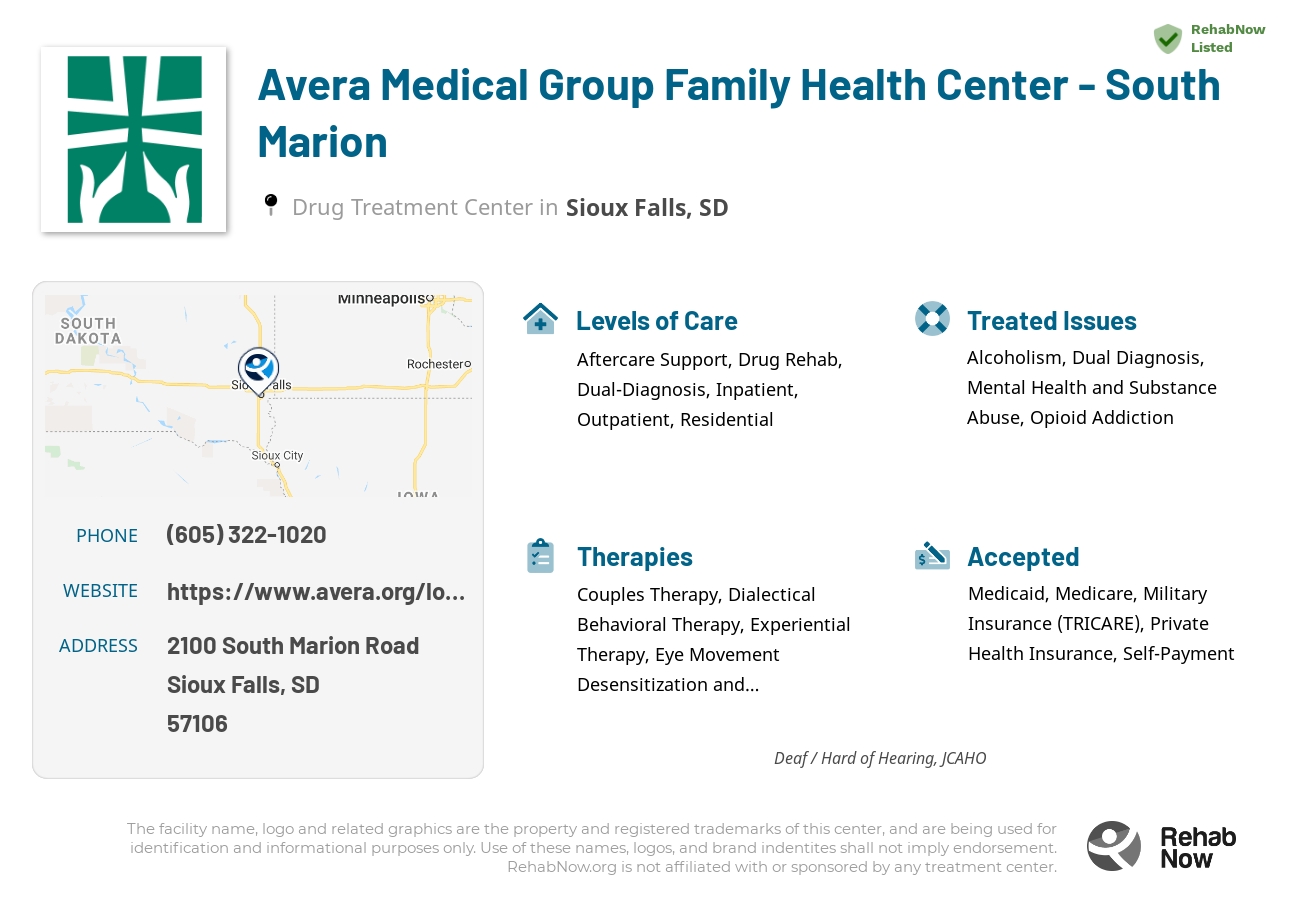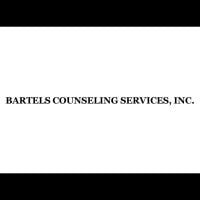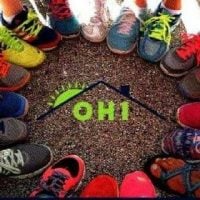Avera Medical Group Family Health Center - South Marion
Drug Rehab Center in Sioux Falls, South Dakota
Avera Medical Group Family Health Center - South Marion in Sioux Falls, South Dakota, is an accredited addiction treatment facility offering comprehensive substance abuse and mental health treatment, including various levels of care and evidence-based therapies, to individuals and families struggling with alcohol, drugs, opioids, and dual diagnosis.
About Avera Medical Group Family Health Center - South Marion in South Dakota
Avera Medical Group Family Health Center - South Marion is a comprehensive addiction treatment facility in Sioux Falls, South Dakota founded in 2006. Their team of experienced and compassionate medical professionals are dedicated to providing high-quality, comprehensive substance abuse and mental health treatment for individuals and families suffering from alcohol, opioids, drugs, and dual diagnosis. They provide a wide range of treatment levels, including aftercare support, drug rehab, dual-diagnosis, inpatient, outpatient, residential, partial-hospitalization, and detox.
Avera Medical Group Family Health Center - South Marion is accredited by the Joint Commission on Accreditation of Healthcare Organizations (JCAHO), the Substance Abuse Mental Health Services Administration (SAMHSA), and is licensed by the state. Their highly-trained medical staff provide a range of evidence-based therapies such as individual and family counseling, cognitive-behavioral therapy, group therapy, and holistic treatments. Furthermore, they accept most private health insurance plans and are affiliated with Avera Health.
Genders
Ages
Modality
Additional
Accreditations
State License
SAMHSA

JCAHO
Conditions and Issues Treated
Opioid addiction has become a significant health problem in the United States. In 2015, there were 91 opioid overdose-related deaths per day, with a substantial increase in mortality rate in 2014.
When opioid addiction has reached a point where a person’s life becomes unmanageable, treatment options are available to help them get sober. Treatment that includes medical care with medications and counseling can help a user transition into sobriety.
When someone in struggles with both addiction and mental or emotional illness, this is considered a dual diagnosis. Dual diagnosis treatment can include therapy for these issues to happen simultaneously, which will allow either of them to be treated effectively.
Sometimes people who have suffered from addiction disorder also suffer from co-occurring disorders such as depression, anxiety, bipolar disorder, etc., making them “dual diagnoses.” Dual diagnoses require specialized treatment programs where drug and alcohol addiction are addressed along with psychiatric illnesses. Some rehabilitation facilities provide patients suffering from cooccurrences a program with highly integrated services and a clean environment with few distractions to help them succeed.
Levels of Care Offered
This center offers a variety of custom treatment tailored to individual recovery. Currently available are Aftercare Support, Drug Rehab, Dual-Diagnosis, Inpatient, Outpatient, Residential, with additional therapies available as listed below.
Inpatient treatment for alcoholism or drug addiction is an option that provides the addict with a supportive environment in which they can stop using. After detox, an inpatient treatment center provides a structured environment for the addict to recover from their addiction and begin taking steps toward a lifetime of sobriety.
This type of treatment is appropriate for addicts that are most in need of intensive care and supervision. This includes those who were unable to quit on their own, those who need more structure than they can get in outpatient treatment, and those whose addiction has led them into legal trouble or severe health problems.
Outpatient treatment is often used for drug addicts in drug rehab. Outpatient treatment consists of counseling and therapy sessions. This form of treatment is also called ‘day-treatment’. The outpatient treatment process begins with the addict’s initial detox period, lasting about ten days.
Outpatient treatment is used for those who are at moderate risk for ‘slipping back’ into the addiction, for those who:
- Are not currently experiencing any side effects from withdrawal and can handle social pressure
- Can handle stressors that might trigger relapse
- Have a stable living environment or have moved out of their previous environment, which was not conducive to being sober
- Have a support system that allows them to go to a facility a few times a week while still keeping their current responsibilities
- Have no legal obligations, being either on parole or probation, that require them to seek treatment at a mandatory facility
- Are not currently experiencing any side effects from withdrawal and can handle social pressure
- Have a stable living environment or have moved out of their previous environment, which was not conducive to being sober
Residential treatment programs are those that offer housing and meals in addition to substance abuse treatment. Rehab facilities that offer residential treatment allow patients to focus solely on recovery, in an environment totally separate from their lives. Some rehab centers specialize in short-term residential treatment (a few days to a week or two), while others solely provide treatment on a long-term basis (several weeks to months). Some offer both, and tailor treatment to the patient’s individual requirements.
Completing a drug or alcohol rehab program is only the first step. Then comes aftercare support. These services include sober living accommodations, career counseling, and AA/NA programs for those struggling with sobriety or who want help maintaining it after initial rehab at an addiction facility.
They can last up to a year or more depending on what’s needed most urgently after the earlier stages are completed.
Therapies & Programs
Because no single treatment is effective for all addicts, the goal of treatment and therapy should be to figure out what works best for each individual. Tolerance and withdrawal levels differ from person to person, affecting the treatment intensity required. Addiction treatment should aim to help addicts develop healthy coping mechanisms for dealing with their addiction and its underlying causes.
Couples therapy works with clients and significant others in a professional capacity to improve relationship dynamics. This can be helpful for addicts who are trying to marry the idea of recovery into their work, family, social lives – any aspect that has to do with relationships. Through counseling sessions, addicts will have an opportunity to talk about their addiction with professional partners.
Family therapy is beneficial for people who are in addiction treatment services because it offers addicts the opportunity to work with their family members to better understand what led them to make choices that contributed to their addiction.
This type of therapy helps family members reach a deeper understanding of how they can best support their loved one during recovery. It also helps the addict better understand their own motivations and triggers that led them to turn to substance abuse.
Family therapy can help addicts in the following ways:
- Assists family members in processing difficult feelings so they don’t blame or resent recovering addicts
- Assists family members in understanding how addiction has impacted the addict and everyone who is involved with them
- Allows the addict to take responsibility for their actions, while encouraging improved communication skills
- Helps family members understand how to best support an individual in recovery so addicts don’t relapse again.
Group therapy can help build a stronger support system and give addicts in Sioux Falls, SD insight into their addiction that they gain through shared conversations. Group therapy occurs in a controlled group environment, exclusive of one on one meetings. This makes it safer for patients to feel comfortable sharing the struggles they’re going through and gaining perspective.
Trauma therapy is beneficial for people who are recovering from drug addiction because it helps them heal from past traumas that may have caused them to turn to harmful substances or led them to experience negative emotions that contributed to their destructive behaviors.
This type of treatment works by processing difficult experiences so individuals can learn how to process these events without having to turn to substances for coping.
Trauma therapy can help addicts in the following ways:
- Helps individuals understand their experiences and emotional responses to difficult events, including why they turned to drugs or alcohol
- Provides them with comfort and support while working through difficult emotions related to these traumatic experiences
- Offers an opportunity for addicts to have a voice and be heard, which can improve their self-esteem
- Can help them develop coping skills so they can better respond to triggers instead of turning to substance abuse.
Dialectical Behavior Therapy (DBT) is a cognitive-behavioral therapy that helps patients understand the relationship between their thoughts, feelings, and behaviors. It is beneficial for those whose addictions and behaviors stem from severe mental health issues. The term “Dialectic” means the integration of opposites. In substance abuse, DBT refers to accepting the patient’s addiction and working to change their thoughts and behavior. It improves life skills such as controlling intense emotions without reacting impulsively, resolving interpersonal conflicts effectively, and promoting awareness about self and others.
Cognitive-behavioral therapy is a technique that is used to help people with addiction. Specifically, it is a way of identifying thoughts and behaviors that cause the addiction. It is typically used in an individual counseling session.
The content explains cognitive behavioral therapy and how it works to address some behaviors that may be leading to unintended consequences in their life, as well as its benefits for those seeking sobriety.
It works by helping people to talk through their issues and addressing the thoughts that cause said behaviors. It is an excellent way of learning about oneself and one’s perception of the world.
Eye Movement Desensitization and Reprocessing (EMDR) helps people get sober by changing how they experience emotions. EMDR is a psychotherapy treatment that has been widely studied with people who have addiction problems.
During the treatment, the patient is asked to recall specific memories that relate to their addictions. At the same time, they follow a moving object with their eyes or tap their hands or feet. This process helps the patient work through their emotions by separating the memory from the distress they feel about it.
By enhancing the brain’s information processing systems, EMDR enables people to “process” experiences that trigger cravings and painful emotions so that they can move forward in their lives.
Patient Experience
Experiential Therapy at Avera Medical Group Family Health Center - South Marion
Experiential therapy uses engaging activities to help patients access deeper, often hidden emotions. For example, the patient could role-play a problematic situation or engage in activities like drawing, painting, poetry writing, music composition, exercising, or journaling to help process intense feelings.
Experiential therapy is a type of therapeutic approach that focuses on having patients work through problems, issues, or emotions by engaging directly in some real experience. Experiential therapy occurs face-to-face with a therapist who helps these people to explore their feelings first hand.
It is based on the belief that to truly understand and gain insight into oneself and behavior; it is necessary and helpful to have real experiences with the issues involved. Some therapists have developed the experiential therapy approach as a way of treating addictive behaviors or dealing with impulses related to addiction. It comes from an existential school of psychotherapy called ‘experiential existential.’
Payment Options Accepted
For specific insurance or payment methods please contact us.
Is your insurance accepted?
Ask an expert, call (888) 674-0062
Avera Health Associated Centers
Discover treatment facilities under the same provider.
- Avera Behavioral Health Center in Sioux Falls, SD
- Avera St. Luke's - Worthmore Addiction Services in Aberdeen, SD
- Avera Medical Group Behavioral Health Clinic - Brookings in Brookings, SD
- Avera Medical Group Behavioral Health Clinic - South Cliff Avenue in Sioux Falls, SD
- Avera Medical Group Psychiatry - Aberdeen in Aberdeen, SD
Learn More About Avera Health Centers
Additional Details
Specifics, location, and helpful extra information.
Sioux Falls, South Dakota 57106 Phone Number(605) 322-1020 Meta DetailsUpdated November 25, 2023
Staff Verified
Avera Medical Group Family Health Center - South Marion Patient Reviews
There are no reviews yet. Be the first one to write one.
Sioux Falls, South Dakota Addiction Information
Although South Dakota is a sparsely populated and somewhat isolated state, it is equally impacted by the national drug epidemic. Substance abuse remains a significant issue that leads to injuries and deaths every year. 17.27% of all deaths between 2008 and 2017 were drug and alcohol-related. Methamphetamines and alcohol are the most commonly abused drug of abuse for those entering treatment in South Dakota.
In Sioux Falls, South Dakota, the community has been greatly impacted by drug addiction and abuse. There were 598 admissions to treatment centers for drug and alcohol addiction in Sioux Falls in 2014. This amounts to a rate of 9.8 per 10,000 population. Most drug rehab programs in Sioux Falls will offer a variety of treatments, such as individual and group counseling, addiction education, aftercare planning, and relapse prevention.
Treatment in Nearby Cities
- Gregory, SD (134.2 mi.)
- Rapid City, SD (323.7 mi.)
- Custer, SD (341.1 mi.)
- Chamberlain, SD (128.6 mi.)
- Rosebud, SD (205.3 mi.)
Centers near Avera Medical Group Family Health Center - South Marion
The facility name, logo and brand are the property and registered trademarks of Avera Medical Group Family Health Center - South Marion, and are being used for identification and informational purposes only. Use of these names, logos and brands shall not imply endorsement. RehabNow.org is not affiliated with or sponsored by Avera Medical Group Family Health Center - South Marion.








